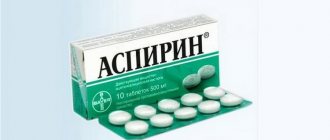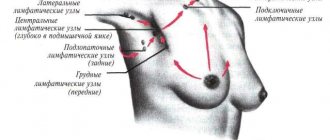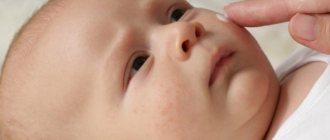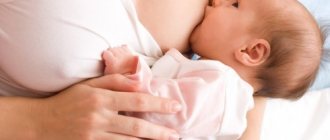In order for the baby to grow strong and not have health problems, in the first year of life his main food should be breast milk, since it contains all the vitamins and microelements necessary for full development and growth. Since everything that the mother eats is also present in milk, a woman during this period also needs to control her diet and try to abstain from harmful foods that contain carcinogens and preservatives.
Alcohol is considered one of the most harmful and dangerous substances for babies. If a nursing mother decides to drink, she first needs to first figure out how long it takes for alcohol to be removed from breast milk and how this process can be accelerated.
To drink or not to drink!
Let's start with the fact that there is no need to take wine and vodka products during lactation. I want to? Certainly! But you're not an alcoholic, right? This means you don’t have to drink, even on holidays. You will say that your friend drank, even before the baby was 3 months old (they say that before this age, alcohol is taboo!), and the child is fine - healthy.
The fact is that it is impossible to check whether your child’s poor performance at school, bad behavior, liver disease that developed after age 30, or your child’s alcohol addiction is associated with a glass of beer or wine that mom drank. It is impossible to live an alternative life and check whether lactation has decreased due to stress or due to drinking alcoholic beverages.
Monsters from a glass
For a newborn or infant, ethanol in the blood is a serious blow to the developing nervous and digestive immune system. Wine and vodka products cause:
- neurological disorders;
- allergies;
- immunodeficiencies;
- diseases of the gastrointestinal tract and hepatobiliary (liver + bile) system;
- heart pathologies.
It’s not for nothing that they say that when drinking alcohol, a person throws his brain into the toilet, along with his urine. But.
There are monsters, but they are small
But 100 ml of alcohol will not cause global and noticeable destruction to a child’s body if he is already a year old and you have sipped a glass of wine. Today no one can determine how much alcohol in small doses at this age will affect the development of the baby. It’s better not to drink, but if you do drink, express, take a break from feeding while the milk is renewed, and don’t get nervous.
When you can't have a drop
There are cases when breastfeeding and alcohol are completely incompatible. This ban applies to the first three months of the baby’s life. It is at this time that alcoholic drinks will cause the greatest harm to the child’s body. After all, the younger he is, the more difficult it is for his organs to cope with a massive toxic attack. At this time, the liver is completely unable to process alcohol toxins, so they will cause poisoning of all internal organs.
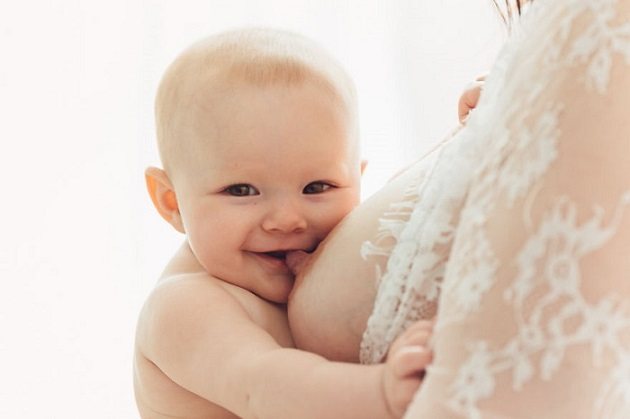
Some doctors believe that alcohol consumption should be strictly prohibited during the first year of a child’s life. This is due to the fact that at this time the baby’s brain is actively forming - new cells appear, it increases in size. The intake of alcohol into the body causes the development of brain cells to stop, which can cause mental illness and mental retardation in a child.
You should also not drink alcohol on an empty stomach - this slows down its elimination and, conversely, improves penetration into the blood. A glass of wine with dinner will penetrate the bloodstream much more slowly.
Of course, it is worth completely abstaining from alcohol during periods of illness of both mother and baby. A weakened body copes much worse with alcohol, so it manages to cause more harm.
When is ethanol inactivated and removed from the female body?
It should be said that ethanol is absorbed by the female body faster than the male body, causes great destruction and is excreted more slowly. About 10% alcohol gets into the milk.
Ethanol decomposes and is excreted depending on 7 factors:
- From the woman's body weight.
- Detoxification capacity of the liver.
- Ratio of muscle mass and fat (volume of body fat).
- Emotional state (under stress, alcohol is deactivated faster).
- Health conditions.
- Alcohol content of the drink.
- The volume of drinks.
There are other factors that influence the intake, breakdown and removal of alcohol. Usually a nursing mother has a need to drink beer, wine or a glass of champagne.
After 200 ml of beer, a nursing mother’s body will recover in about an hour, after a bottle it will take up to 5 hours, if the weight is small, about 60 kg. Large women will get rid of the ethanol contained in a bottle of beer in 2-2.5 hours.
Wine is excreted in slim women in 2.5 hours (100 ml) and in 8 hours (300 ml). Donuts get rid of ethanol 2 times faster.
Champagne
Champagne easily and quickly penetrates fabrics and does not leave them for a long time. For nursing mothers weighing 60 kg, 300 ml of champagne stays in the body for up to 4 hours. Fat ladies have an hour less.
Table for the removal of alcohol from a woman’s body
The table below provides information on the rate at which ethanol is eliminated from the body.
Please note that we are talking about the breakdown of alcohols; breakdown products are removed with biological fluids. If you drank a glass of beer and did not express after 3-4 hours, toxins remain in the milk.
| The period of complete elimination of alcohol from the body | ||||
| Alcohol strength | ml. | Person weight 60 kg | Person weight 70 kg | Person weight 80 kg |
| 4 % | 100 300 500 | 35 min. 1 hour 44 minutes 2 hours 54 minutes | 30 min. 1 hour 29 minutes 2 hours 29 minutes | 25 min. 1 hour 18 minutes 2 hours 11 minutes |
| 6 % | 100 300 500 | 52 min. 2 hours 37 minutes 4 hours 21 minutes | 45 min. 2 hours 14 minutes 3 hours 44 minutes | 39 min. 1 hour 57 minutes 3 hours 16 minutes |
| 9 % | 100 300 500 | 1 hour 18 minutes 3 hours 55 minutes 6 hours 32 minutes | 1 hour 07 minutes 3 hours 21 minutes 5 hours 36 minutes | 59 min. 2 hours 56 minutes 4 hours 54 minutes |
| 11 % | 100 300 500 | 1 hour 36 minutes 4 hours 47 minutes 7 hours 59 minutes | 1 hour 22 minutes 4 hours 06 minutes 6 hours 50 minutes | 1 hour 12 minutes 3 hours 35 minutes 5 hours 59 minutes |
| 18 % | 100 300 500 | 2 hours 37 minutes 7 hours 50 minutes 13 hours 03 minutes | 2 hours 14 minutes 6 hours 43 minutes 11 hours 11 minutes | 1 hour 57 minutes 5 hours 52 minutes 9 hours 47 minutes |
| 24 % | 100 300 500 | 3 hours 29 minutes 10 hours 26 minutes 17 hours 24 minutes | 2 hours 59 minutes 8 hours 57 minutes 13 hours 03 minutes | 2 hours 37 minutes 7 hours 50 minutes 13 hours 03 minutes |
To be fair, it should be said that 10% ethanol from a drink containing 4-6% alcohol (beer) or 11% (champagne) is not much. But remember, the child’s liver is not mature enough to deal with poisons. But the baby is already struggling with toxins, faced with microbial intoxication or pesticides received by the mother’s body with food.
Beer while breastfeeding: can you drink it?
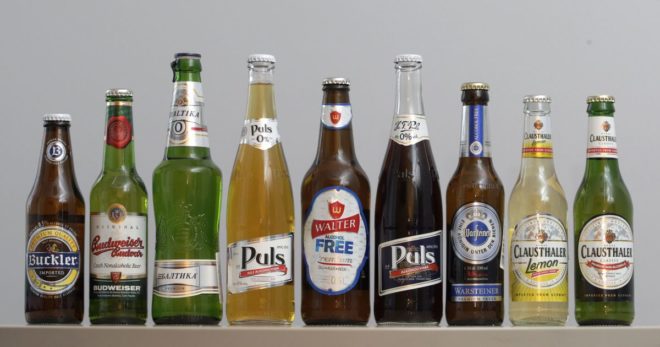
Beer is a popular low-alcohol drink, its strength is usually 3-6%. The drink is most often made from barley. In addition to alcohol, it also contains useful substances (vitamins, minerals, etc.).
Table 2 – Chemical composition and BJU of 0.5 l beer
| Substance name: | Type: | Weight: |
| Main substances: | Carbohydrates | 20 g |
| Squirrels | 2.5 g | |
| Alcohol | 20 g | |
| Carbon dioxide | 2 g | |
| Water | 450 g | |
| Vitamins: | B1 (thiamine) | 0.02 mg |
| B2 (riboflavin) | 0.2 mg | |
| B6 (pyridoxine) | 0.4 mg | |
| H (biotin) | 0.003 mg | |
| A nicotinic acid | 4 mg | |
| Folic acid | 0.1 mg | |
| Pantothenic acid | 0.6 mg | |
| Elements: | Potassium | 250 mg |
| Phosphorus | 0.15 g | |
| Sulfur | 0.1 g | |
| Magnesium | 50 mg | |
| Calcium | 50 mg | |
| Silicon | 0.02 g |
Pros and cons of beer
The presented data on the beneficial properties of beer are not related to the official point of view of the medical community:
- Reduces the likelihood of developing Alzheimer's disease.
- Beer prevents coronary heart disease better than other alcoholic drinks.
- Prevents the occurrence of certain types of cancer and reduces the likelihood of diabetes.
- Beer contains a lot of vitamins B12, B6, B2.
- Silicon in beer strengthens bones.
- Beer kills Helicobacter bacteria, which causes stomach ulcers.
All the described benefits apply to moderate beer consumption.
Despite the possible benefits of beer, it has the same negative qualities as all other alcohol-containing drinks. Beer can harm not only a nursing mother, but also a baby. If you abuse beer, ethanol in significant quantities will be transferred to the baby through breast milk.
Older studies, some in animals, have shown that drinking beer can increase blood levels of prolactin within 30 minutes of drinking (the hormone increases milk production) [7]. At the same time, the level of oxytocin, a hormone that helps milk “come out” of the breast, drops. We can conclude that the likelihood of lactostasis increases.
Example. A mother with a height of 180 cm and a weight of 72 kg drank a bottle of light beer with a strength of 4.5% and a volume of 500 ml. Ethanol in the blood will reach a maximum of ~0.27 ‰ in 30-60 minutes. The elimination time from milk will be about 2 hours.
Non-alcoholic beer: the better for breastfeeding
Non-alcoholic beer tastes like regular beer, but its alcohol content does not exceed 0.5%. The drink has almost no negative effect on lactation and the composition of breast milk. Due to the low alcohol content, there are virtually no harmful effects.
However, there is no need to abuse it: when taking “horse” doses of non-alcoholic beer, ethanol will still enter the body of the nursing mother, and therefore the baby, in significant quantities.
Conclusion on beer: tips for a nursing mother
If a nursing mother’s body asks for a sip of cold beer, there is no need to interfere with it. A glass of light beer will not cause any particular harm to health and lactation. But it’s better to opt for beer with a strength of up to 4.5%, and even better if it’s a non-alcoholic drink.
How can a nursing mother get rid of alcohol faster?
If you are reading the article after drinking a glass, you probably want to know how to remove alcohol? There are no special medications for nursing mothers. Detoxification therapy can be used:
- enterosorbents: carbon (white and activated), enterosgel;
- increased fluid intake.
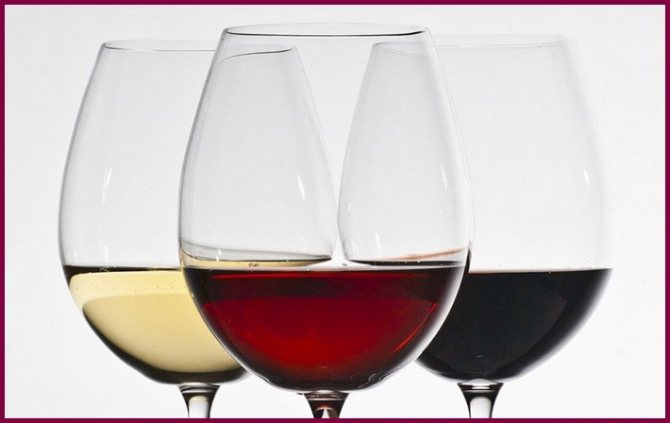
Sometimes it is recommended to take Regidron. But this remedy is suitable for dehydration due to alcohol intoxication. After a glass of low-alcohol drink, this drug is not needed.
The instructions do not recommend the use of traditional hangover remedies (for example, Zorex). There is no information on the effects on the body of the mother and baby during pregnancy and breastfeeding.
If you really want to, then you can
In many ways, the strength of alcohol depends on its strength and quality of the drink. Strong drinks (cognac, vodka) affect the body of the mother and child much more strongly than a glass of weak wine or champagne.
The amount of alcohol you drink matters no less. Even if there is light wine on the table, if you drink a whole bottle, it will be the same as drinking a glass of vodka.
It is important to remember that the greatest harm will come from regular consumption of alcohol, regardless of its strength. Maternal alcoholism becomes a heavy blow for the child, causing serious deviations in its development.
Popular pediatrician Komarovsky recommends giving up vodka, and if you want to drink, recommends a glass of good beer. The doctor believes that a high-quality drink can even bring certain benefits, since it contains both vitamins and natural ingredients, such as malt and brewer's yeast.
However, even in this case, moderation should be observed, because alcohol, preservatives and other unsafe components are also included in the drink. One of Dr. Komarovsky's recommendations is to choose bottled drink options rather than canned ones. Ideally, non-alcoholic.
How long after drinking can you feed your baby?
On average, ethanol in small doses is eliminated in 3-7 hours. During this period, you should refrain from feeding. It is more effective to use the table above and analyze the dose of alcohol taken, the mother’s weight, and determine the period of abstinence from feeding.
Do you doubt whether to feed your baby or not? Use milk alcohol test strips and then decide.
This concludes the review of the topic. And we invite you and your friends to our website. Share information about the material via social networks.

Alcohol is harmful to health, and even more so for a nursing woman. Breastfeeding is a natural process in the life of a tiny baby. The further development and immunity of the child depends on it. Is it possible to drink alcohol while breastfeeding is a very controversial issue. Some argue that a glass of wine or beer will not pose a risk to the baby’s health, others say the opposite. 99% of doctors say that no alcohol should be consumed while breastfeeding. Everything a woman eats or drinks ends up in her small body. To begin with, a nursing woman should know what consequences await her child when drinking alcohol.
Which alcoholic drinks are acceptable during breastfeeding, and which are strictly prohibited?

Despite the complete ban by Russian doctors on the use of alcohol by a nursing woman, abroad it is not considered inappropriate or harmful to the child if a mother allows herself a glass of red wine a couple of times a week or a glass of beer on Friday evening.
It is considered much more dangerous to abstain from the usual joys of life; this can aggravate postpartum depression.
A mutual categorical ban is imposed on strong alcoholic drinks - cognac, whiskey, vodka.
The ethanol content in them is more than 40%, which means it will take a long time to remove it from the body - this is stressful for the child, for example, he does not sleep during the day and for the nursing mother. Also, under the influence of a strong drink, concentration, attentiveness and vigilance will deteriorate, which should not be allowed.
How and how long does it take for alcohol to pass into breast milk?
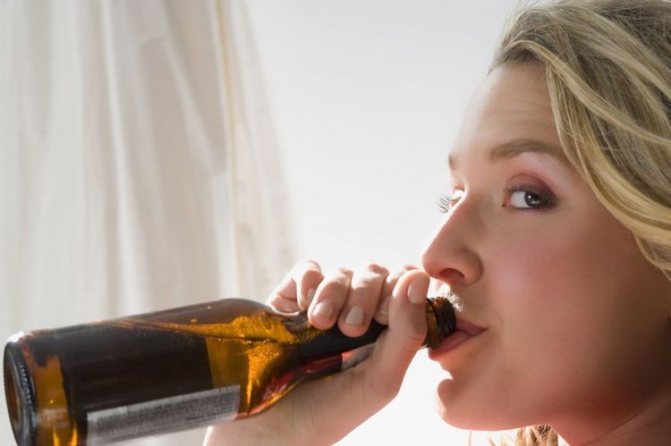
No matter what myths there are that alcohol is beneficial during breastfeeding, it still penetrates into milk through the mother’s bloodstream. On average 30-60 minutes after its use. If a nursing mother consumes it during meals, the time increases to 1.5 hours. Drinking on an empty stomach slows down elimination from the blood. According to statistics, 10% of what you drink ends up in milk. The percentage ratio may vary, everything will depend on the weight of the nursing mother and the dosage of the alcoholic product consumed.
Dosage and timing of alcohol removal from the blood
To avoid harm to the infant, alcohol-containing drinks should be taken in moderation. Among friends, on some holiday, a nursing woman can afford 150-200 ml of wine, champagne, 350 ml of beer, 30 g of strong alcohol. You can use just one thing, not all together. This dosage is eliminated from the body in 1 to 3 hours, depending on the percentage of strength and weight of the woman. During this period of time, the alcohol will completely leave the mother’s body.
How long after can you feed your baby?
Carry out this procedure before drinking or expressing milk for further feeding of the baby, at a certain time for him. Breastfeeding after drinking the drink can be done three to four hours later.
How does “drunk milk” affect a baby?
If you breastfeed after drinking alcohol, despite the ban, you can cause irreparable harm to the baby’s body.
A newborn child under the age of four months is most susceptible to the influence of alcohol. But even after the baby reaches this age, the harmful effects of alcoholic beverages do not go away.
The influence of alcoholic drinks is as follows:
- The baby's unformed liver is destroyed beyond repair.
- The gastrointestinal tract does not digest ethyl alcohol, colic, constipation, increased gas formation occur, and in older age, progressive gastritis may occur.
- The brain and other organs are unable to develop and grow correctly, neural connections are disrupted, and the risk of mental retardation increases.
- Due to underweight, the child lags behind in physical development.
- Immunity decreases, chronic diseases develop (bronchitis, otitis media, asthma).
In this regard, according to doctors, alcohol is prohibited while breastfeeding.
Alcohol elimination table

In an hour, the body can eliminate 120 ml of alcohol. The dosage of alcohol-containing drinks is given in the table, along with the time for removing ethanol from the body for women on breastfeeding.
Based on 150 ml of alcohol
Woman's weight in kg
It is easy to calculate the time for removing ethanol from the body; you need to multiply the amount taken by the removal time, taking into account the weight.
Recommendations on how to reduce harm
Of course, the taboo on champagne during breastfeeding shocks some mothers, since it is very difficult for many to resist a glass of this drink. If a woman nevertheless decides to drink, then a balanced and competent decision will help to minimize harm to the baby.
Here are some tips for breastfeeding mothers:
- After drinking alcohol, note the time. At least an hour and a half should pass, preferably 3. After this, you can breastfeed.
- The child should be fed before drinking alcohol.
- It is better if you drink the fizzy drink before your longest sleep - at night.
- Drink plenty of water after drinking champagne to help the alcohol leave your system faster.
- You should remember the safe daily dose of alcohol and its elimination time.
- In no case should you combine antipyretics (paracetamol) with alcohol.
- Still, try replacing alcohol with other pleasures: delicious food, a warm bath, a relaxing massage, communication with your child.
- You should not visit places where alcohol is consumed, so as not to provoke the desire to drink.
Some women make the mistake of thinking that pumping can remove ethanol from their milk. Breast milk will only become safe after the time indicated above.
How often and in what quantity is allowed during breastfeeding?
Alcohol should not be drunk on an empty stomach . For the first time, you can drink 50 ml of champagne. Next, the dose for the mother is 150 ml no more than once every 2 weeks.
IMPORTANT ! The younger the child, the more severely the excess dose of alcohol affects him.
What happens if you exceed the frequency and volume of consumption?
If the mother consumes champagne excessively or frequently, or if the daily or weekly dose is exceeded, the baby will experience weakness, drowsiness, and apathy. If a woman does not stop drinking, then this behavior will cause delays and deviations in the development of the child.
Doctor Komarovsky's opinion

Beloved by all mothers, pediatrician Komarovsky says that alcohol consumption during breastfeeding has different effects on children. A glass of low-alcohol drink will not harm a child’s small body. But strong alcohol can definitely have bad consequences.
The doctor says that beer contains certain vitamins that are beneficial for breast milk. The expert advises all mothers who love beer to buy a non-alcoholic drink, only to carefully look at the composition. If you systematically drink alcoholic cocktails during breastfeeding, problems with the baby’s health may begin.
Can a drink be good for a woman?
The only benefit of drinking champagne for a mother is that a woman can take her mind off her worries and get rid of nervousness. However, this will only bring harm to the baby. Therefore, mothers need to look for an alternative way to relax, since the child’s health is formed in the first two years, and breast milk is an indispensable source of nutrition.
Is it worth it to “spoil” it by following a fleeting desire to drink? Of course not. For example, you can replace an alcoholic drink with non-alcoholic children's champagne.
Very often, breastfeeding women are advised to drink a little champagne to increase the amount of breast milk. Research has shown that alcohol does increase levels of prolactin , which is responsible for lactation, but also interferes with the production of oxytocin. This means that milk cannot be fully released from the breast.
A woman, having drunk a glass of champagne in the evening, may experience stagnation of milk in the morning, and the child will not be able to get enough. In addition, the milk will have a strange taste and smell.
Consequences for the child and mother

Alcohol entering a small child's body through milk is excreted much more slowly than from the body of an adult woman. The child develops lethargy, poor, restless sleep and apathy towards everything. This can lead to irreversible consequences for the baby’s health.
Systematic drinking of alcohol while breastfeeding can lead to the following problems affecting the baby:
- Alcohol negatively affects the children's nervous system, they become irritable, eat and sleep poorly.
- The baby’s liver, which is not yet fully formed, suffers 2 times more than the liver of the woman who feeds him.
- The digestive system of a small child, with unformed microflora, can have consequences. The child develops colic, a swollen belly, unstable stools and weight loss.
- Systematic consumption of alcohol during breastfeeding can lead to toxic poisoning of the child.
- In a nursing mother, when drinking strong drinks, the volume of milk decreases due to the narrowing of the milk ducts. Pain occurs when feeding. In addition, the reaction of a drunk nursing woman is dulled, because of this she will not be able to react so quickly when the baby is in danger.
- A nursing woman who drinks frequently can lead her child to alcohol addiction.
If you can’t eliminate alcohol from your diet 100%
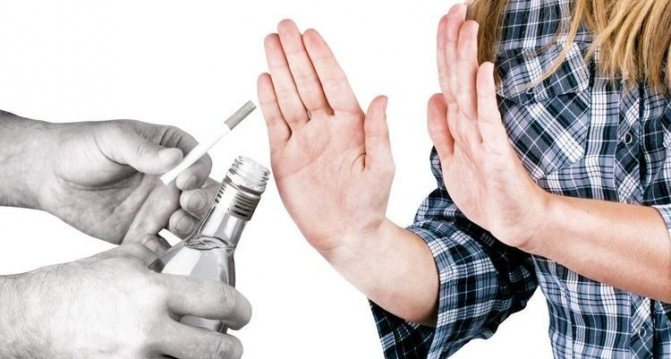
Alcohol addiction, especially during breastfeeding, is very bad. Well, if it just so happens that you can’t remove alcohol from your diet 100%, then it would be less safe to at least reduce the amount of alcohol you drink, or even give up breastfeeding altogether. Try to pump several times before drinking alcohol for your baby. Give preference to homemade alcoholic drinks, they contain fewer toxins. Do not drink on an empty stomach or without food, this speeds up the release of alcohol into the blood. Drink light alcoholic drinks such as wine and beer. Avoid strong ones for the duration of breastfeeding. Don’t forget about the dose you drink; the larger it is, the longer it takes to be removed from the body.
What to do if you can’t eliminate alcoholic beverages 100%
If a nursing mother still fails during breastfeeding or for some reason is unable to completely give up alcoholic beverages, she should adhere to several rules that will help minimize the negative impact of ethanol on the child:
- Feed your baby before a feast involving alcohol. Remember that it is necessary to provide the required “safe” amount of nutrition, express “pure” milk so that there is enough for several meals for the baby.
- Determine for yourself the maximum permissible dose of alcoholic beverages: one hundred milliliters of wine or beer is your “safety limit”.
- Express the milk in advance and put it in the refrigerator.
- Never give your baby “poisoned” milk, if available. Remember, this will only harm your child.
- Give preference to good quality products, even if the price of this drink exceeds your financial expectations, because your child’s health is much more valuable.
So, let's summarize. Probably no one will argue with the fact that the time of pregnancy planning, the pregnancy itself, as well as the period of breastfeeding are important stages in the birth of a new little life. Future parents should understand how important this time is in the subsequent development of the baby.

The metabolic process depends on gender, age, weight, chronic diseases and the amount of drink.
Men eliminate alcohol faster than women.
The strength of the drink and the frequency of consumption also affect the metabolic rate.
Alcohol is excreted from the body during breastfeeding in the same way as in non-breastfeeding women.
| Person's weight/Type of alcohol | 60 kg | 70 kg | 80 kg | 90 kg | Volume of alcohol consumed, grams |
| Beer | 35-50 min. | 30-45 min. | 25-40 min. | 20-30 min. | 100 |
| 1.5-2.5 hours | 1.5-2.15 hours. | 1.2-2 hours | 1.1-1.4 hours | 200 | |
| 3-4.5 hours | 2.5-3.5 hours | 2.1-3.1 hours. | 2-3 hours | 300 | |
| Champagne | 1.36 hours | 1.2 hours | 1.12 hours | 1 hour | 100 |
| 4.47 hours | 4 hours | 3.35 hours | 3.1 hours | 200 | |
| 8 hours | 6.5 hours | 6 hours | 5.2 hours | 300 | |
| Wine | 2.3 hours | 2.1 hours | 2 hours | 1.5 hours | 100 |
| 7.5 hours | 7.2 hours | 6.7 hours | 6.2 hours | 200 | |
| 12 o'clock | 11.1 hours | 9.4 hours | 8.5 hours | 300 | |
| Vodka | 5.48 hours | 4.58 hours | 4.21 hours | 3.52 hours | 100 |
| 17.25 hours | 14.45 hours | 13 o'clock | 11.3 hours | 200 | |
| 30 hours | 25 hours | 21.45 hours | 19.20 hours | 300 | |
| Cognac | 6 hours | 5.15 hours | 4.34 hours | 4.04 hours | 100 |
| 18.15 hours | 15.4 hours | 13.4 hours | 21 o'clock | 200 | |
| 30.2 hours | 26 hours | 11 p.m. | 20.2 hours | 300 |
Myths about drinking alcohol during breastfeeding
There are many myths among mothers who breastfeed about the benefits of drinking alcohol while breastfeeding. Some people think they are true, but the nature of the body and doctors say the opposite. Is it possible for a nursing mother to drink alcohol? Let’s consider whether it’s a myth or true:
Myth 1, a child sleeps better
MYTH: A nursing woman is recommended to drink a small glass of wine or beer before night feeding to ensure her baby sleeps soundly.
TRUTH: in fact, from such “drunk” milk the baby falls asleep quickly, but his sleep is very short and restless. He may wake up several times during the night.
Myth 2, milk volume increases
MYTH: beer increases lactation, more milk arrives in the mammary glands.
TRUTH: after drinking beer, the baby actually suckles more often. Not because more milk arrives, on the contrary, because of alcohol, the volume of the dairy product is reduced by 25%. The child does not get enough to eat and this makes him eat more often.
Myth 3, pumping helps

MYTH: Frequent pumping helps remove ethanol from milk faster.
TRUTH: Denatured alcohol travels through the bloodstream to the mammary glands, but does not accumulate in milk. Next, it returns again to the blood for removal from the body. Hence the conclusion that pumping does not affect the speed of its elimination until it naturally leaves the female body. Drinking large amounts of liquid also does not help.
Myth 4, alcohol does not affect the taste of milk
MYTH: Many mothers believe that alcohol will not affect the taste of milk.
TRUTH: like many foods, as well as alcoholic drinks, they do not change the taste of milk in a very good way. The child can easily refuse the next feeding, the taste will be different from the milk he is used to.
Myth 5, relieves postpartum stress
MYTH: Small doses of alcoholic drinks help relieve postpartum depression and stress.
TRUTH: A very dangerous misconception. Alcohol will only increase depression and stress. Moreover, it can cause stress in a newborn who has just begun to adapt to life on earth.
When the milk becomes “clean” and you can resume feeding
When calculating the time during which you cannot feed a child after drinking alcohol, you need to take the time in the table and add 10-15 minutes of reserve.

Before the feast, it is advisable to express milk for 2-3 or more feedings. This way the child will not be stressed without his usual food.
Monitoring the condition and health of the breast is also necessary. If a woman has breast pain during and after breastfeeding, she should definitely see a doctor. These symptoms are not good.
If milk is overfilled, you need to express it to avoid lactostasis or mastitis.
This milk should not be stored or offered to a child.
After the required time, feeding the baby will be safe, and breastfeeding can be resumed without harm to the baby.
conclusions
The time when pregnancy is planned, the process of bearing a child and the period of breastfeeding, the most important period of time in the birth of a tiny life. We must understand that these periods are very important in the further development of the baby. How the child grows and develops depends only on us. You can and should do without alcohol during this very important time. After all, breastfeeding goes very quickly, it is better to make sure that it takes place without alcohol.
Alcohol and hangover
Any alcoholic drink contains alcohol.
It, in turn, negatively affects the nervous system and digestive organs. The initial feeling of happiness and freedom after drinking alcohol turns into a hangover. It occurs due to intoxication of the body. This is expressed by headache (due to vasoconstriction), bad mood, possible tremors, nausea and vomiting. And these are not all signs of a hangover. If you do not know the limits in drinking strong drinks, you can damage your liver. If this is how alcohol affects an adult, then what will be the reaction of a child’s body? Therefore, nursing mothers are interested in whether alcohol passes into breast milk, and how the body gets rid of ethanol.
Reviews
She breastfed her daughter until she was one and a half years old, during which time she never allowed herself to drink alcohol. I believe that the health of a child is more important than being drunk.
I am breastfeeding, my son is already 5 months old. Sometimes I allow myself to drink a glass of wine in the evening. I do not agree that alcohol does not relieve stress and fatigue, as written in the article. This way, I rest physically and mentally.
Julianna
For health reasons, I cannot drink alcohol, but sometimes I really want to. So my six-month-old daughter receives only healthy milk.
Almost every person periodically drinks alcoholic beverages in one form or another. In reasonable quantities, alcohol helps you relax and lift your mood a little. But the question is: is it possible to drink alcohol while breastfeeding? If during pregnancy a woman abstained from it completely, then there is no clear opinion regarding the period of breastfeeding.
Some believe that not a drop of alcohol is allowed during lactation, while others can quite easily drink a glass or two of wine with their family or at the holiday table. There are also those who claim that alcohol can be beneficial during breastfeeding. Is it really? Let's look into these issues and find a middle ground.
Safety regulations
Since there is still no clear opinion on the effect of alcohol on breastfeeding, breastfeeding consultants have proposed a set of rules that help minimize negative consequences:
- keep track of the quantity. You should not get carried away with “light” alcohol, and it is better to avoid strong drinks altogether;
- complete abstinence from alcohol up to 3 months after birth;
- consider your weight. The greater the body weight, the faster alcohol is eliminated from the body;
- Do not drink on an empty stomach or without a snack. This accelerates the penetration of alcohol into the blood, and therefore into the milk;
- avoid excessive intoxication. This will not only seriously “hit” the child’s body, but can also cause physical injuries to the baby - the mother’s reaction slows down and she may not have time to catch him or stop him in a dangerous situation.
Does alcohol pass into breast milk?
Alcoholic beverages are divided into products with low ethanol content and high ethanol content. It is clear that the stronger the alcohol-containing cocktail, the more dangerous it is for the baby. Therefore, drinking fortified drinks for the mother of a baby is not only not recommended, but also prohibited.
The molecular formula of alcohol allows it to easily penetrate into the blood, after which ethanol is transported to the tissues and cells of the body, and also penetrates into biological fluids, including breast milk. The peak concentration in the blood (and therefore in milk) occurs in the first 0.5-1.5 hours after drinking alcohol. If we talk about sparkling wine, champagne, then it reaches the milk ducts even faster - within the first 10 minutes.
So, according to research, alcohol taken by the mother enters both the blood and breast milk in an amount of approximately 10%. How quickly this happens and how long it will take for the alcohol to be neutralized depends on several factors:
- Mother's weight. The more the mother weighs, the faster the alcohol is eliminated. So it is more dangerous for thin women to drink a lot than for well-fed young ladies.
- Amount of alcohol consumed. The generally accepted unit of measurement for alcohol is the drink. Simply put, a drink is a serving of an alcoholic drink, and depending on the type of alcohol, the drink will be different. So, 1 drink of beer is 340 g (mug), wine - 140 g (glass), vodka - approximately 40 g (shot glass). The more drinks you drink, the greater the degree of intoxication and the longer the alcohol “dissipates.”
- Strength of the drink. The percentage of alcohol is directly related to its concentration in the blood. For this reason, fortified alcoholic drinks are extremely undesirable for nursing mothers.
- Alcohol was consumed with food or on an empty stomach. If you drink it on an empty stomach, the wine or beer will be absorbed much faster than if it was drunk during a heavy dinner.
In principle, alcohol is quickly eliminated from the mother’s body, unless, of course, we are talking about drinking. Therefore, in isolated cases of taking moderate portions of alcohol, as soon as the mother feels neurological balance (after about 2-3 hours), you can feed the baby.
Another important factor: if the baby is under 3 months old, there is a strict taboo on alcoholic drinks. The baby’s body adapts to its new life, and its organs are in the stage of final formation. It is completely unpredictable how the toxic effects of alcohol, even in small quantities, can affect the infant liver. Remember that toxic substances can penetrate the brain of a newborn, but the baby is in the process of formation and development.
Do I need to express milk?
Alcohol, once in the stomach, penetrates everywhere. The main difference is the concentration of the substance. Only 10% of the ethanol molecules contained in the blood penetrate into milk. The substance is removed simultaneously from all organic systems. Therefore, when asked whether it is necessary to express milk after drinking alcohol, doctors answer that this is not necessary.
Expressing to minimize the concentration of alcohol in the blood is useless, since all organs are renewed in a certain mode. It will not be possible to influence him from the outside. After the time indicated in the table has passed, you can continue feeding without fear that the baby will be poisoned by ethanol molecules. To be safe, you can add 1-2 hours to the alcohol withdrawal time, and then feed the baby.
Impact on the child and possible consequences
Let's look at the harm that alcohol abuse can cause while breastfeeding. So, if a nursing mother constantly drinks alcohol, the consequences for the baby can be as follows:
- Neurological problems. Alcohol in large doses poisons the baby’s body, having a depressing effect on it. The child is often drowsy, but this sleep cannot be of high quality, so tearfulness often replaces lethargy. The baby does not get enough sleep, causing the nervous system to become exhausted.
- The cardiovascular system suffers. Alcohol consumed by the mother increases the baby's heart rate and lowers blood pressure, causing the baby to look lethargic.
- Decreased lactation. Contrary to popular belief that beer can increase lactation, any alcohol, on the contrary, has a depressing effect on the process of milk production. Lack of nutrition affects the baby’s poor weight gain.
- Toxic effects on the brain. Alcohol penetrates the blood-brain barrier, causing toxic damage to brain cells. It is not surprising that children fed milk from alcoholic mothers lag behind in development. In extremely severe situations, convulsive manifestations are possible.
- The immune system suffers. When drinking alcohol, the child’s immunity is weakened, as a result of which he may suffer from respiratory diseases more often than usual, often becoming chronic.
- Problems with the digestive tract, allergies. As a response of the body to alcohols, there may be an allergic reaction in the form of skin rashes, redness, etc. In such children, colic and enterocolitis are observed more often than usual.
Of course, we are talking here about pathological constant intoxication. Drinking alcohol only occasionally and in small quantities will not affect the baby’s health in any way.
Another danger due to which drinking while breastfeeding is not recommended is the dulling of vigilance on the part of the mother. A woman who drinks too much is not always aware of her actions. Taking the baby into her bed for feeding at night can cause her to fall asleep soundly, which in some cases turns into a tragedy. And a staggering woman, unable to keep her balance, can simply drop her baby, which is also fraught with fractures, bruises and other injuries.
5″ rules for a safe holiday
So can a nursing mother have wine or beer? And how to use them correctly to prevent harm to the baby?
Mothers can drink alcohol in moderation, according to Thomas Hale, MD, professor of pediatrics at Texas Tech University. And feed the baby immediately after they feel “neurologically normal.” This statement is given in the book “Medicines and Breast Milk,” published by the author in 2006.
At the same time, the author points out the following features of drinking alcoholic beverages.
- The intensity of the influence of alcohol directly depends on the amount drunk. Do not abuse wine, beer, champagne while breastfeeding! You can allow one glass on a holiday, but you should not take it as a daily norm. Regular use is unacceptable and is a sign of alcoholism.
- Avoid drinking alcohol completely until your baby reaches three months of age. Even minimal, permissible doses can provoke unforeseen consequences.
- Consider your own weight. The smaller it is, the longer the breakdown products of ethanol are removed from the body. And, conversely, in obese women these processes occur faster.
- Don't drink on an empty stomach. When eating food, the intensity and volume of ethanol absorption decrease.
- Don't get drunk. In this state, the baby can receive a critical dose of an “alcoholic cocktail”, which will cause intoxication. A woman cannot control her own behavior, which creates the risk of crushing the baby with her body when sleeping together.
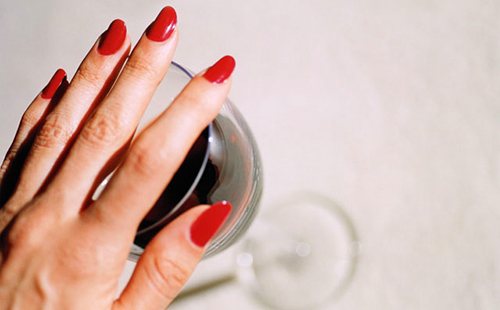
But there are rules that will allow you to take part in the celebration and not harm the baby’s health.
- Feed your baby immediately before the event if you plan to drink. The next feeding will be safe only when you feel completely sober.
- Don't drink too much. Alcohol is safe during breastfeeding in moderate doses. A glass of wine or a glass of beer will not be superfluous for either you or your child.
- Stock up on milk. If you are not confident in your own abilities, express enough milk for one or two feedings and put it in the refrigerator. There it can be stored for a day.
- Do not put your baby to your breast if you feel it is too full. In this situation, it is necessary to decant the excess and pour it out.
- Drink non-alcoholic drinks. Young mothers can drink non-alcoholic wine while breastfeeding; beer without ethanol is allowed. The only limitation can be the quality of the product. If the drink contains artificial colors and preservatives, they can provoke an allergic reaction in the baby.
Alcohol and breastfeeding are a woman’s responsibility, the need to make decisions on which the baby’s health and its normal development depend. Every mother has the right to make such decisions carefully, assessing the risks and her own condition. But you shouldn’t be afraid of alcohol during lactation, as doctors point out. And when asked whether a nursing mother can drink non-alcoholic beer or wine, they answer: these drinks will be a safe alternative, especially if you can’t stop at just one glass on a holiday.
Myths about drinking alcohol during lactation
The topic of breastfeeding has long drawn a trail of myths and legends, and questions regarding alcohol consumption are no exception. What are the most common misconceptions on this topic?
- Beer enhances milk flow. To date, there is not a single study proving this statement. Good lactation depends on the intake of warm drinks (teas, fruit drinks) and the production of the hormone oxytocin. Ethyl alcohol, on the contrary, inhibits milk production. Of course, beer contains useful microelements, but the alcohol content and fusel oils are clearly not harmless in large quantities.
- To help your baby sleep better, you need to drink a glass of wine at night. The principle of action of alcohol-containing drinks is expressed in the development of euphoria, followed by lethargy. Studies have shown that after the mother drank wine, children fell asleep faster (that is, the period of falling asleep was shortened), but the sleep was not as deep, so they woke up more often during the night, which generally had a negative effect on the duration of sleep and the nervous system. You can read more about drinking wine during breastfeeding here.
- The baby suckles better if the mother has had a little drink. Researchers experimentally found that children sucked milk flavored with alcohol better and more actively, but at the same time, over the course of 4 hours after drinking alcohol, they received less milk in total than usual. Therefore, drinking alcohol with the aim of “feeding” a child, causing, so to speak, his appetite, would be wrong.
Is it possible to drink non-alcoholic beer or wine while breastfeeding? How does it affect mother and baby? In fact, even these types of drink contain alcohol in amounts ranging from 0.5 to 2%. Scientists have found that even after drinking a large amount of non-alcoholic beer, the ethanol content in milk is minimal, so it does not pose any harm to the baby.
Nevertheless, one should take into account the individual reactions of the mother’s body and remember that even non-alcoholic drinks can disrupt a woman’s coordination of movements and temporarily cloud her judgment. And this is an unacceptable luxury for someone caring for an infant.
5 rules for safe use if a woman is breastfeeding
Ethyl alcohol (ethanol, C2H5OH) is found in all alcoholic drinks, the only difference is in concentration.
But regardless of the quantitative content, it has a detrimental effect on the female body. 1Ethanol is a poison, the processing of which takes a large amount of water from the body. Dehydration worsens the condition of the skin, wrinkles appear earlier, and the complexion acquires an unhealthy yellow tint. Lack of water also reduces the amount of breast milk. As a result, the baby may lose weight.
2Alcohol is very high in calories, and at the same time, a huge amount of human resources is spent on removing it from the body, so the consequences of frequent consumption can be a sharp weight gain or, conversely, unhealthy thinness.
3 After the familiar relaxed state, fun and feeling of euphoria, anxiety, overexcitation may arise, and postpartum depression may intensify. Sleep patterns and quality are disrupted. This is very dangerous for a young woman; concentration decreases, she becomes irritable and reacts sharply to the scream or cry of a child.
4 Ethyl alcohol is highly soluble in water, so it has the most destructive effect on organs and tissues in which blood circulation is most intense. The brain is 80% water, and ethyl alcohol “hits” it first. Intoxication is the numbness and subsequent death of brain cells.
In connection with this phenomenon, mental dependence arises, to which women are more susceptible than men. Lightness, good mood, relaxed state - it’s easy to get used to, and it’s difficult to return to the gray, monotonous everyday life. Caring for a baby, lack of sleep, and lack of free time depress a woman, and a bottle can become an antidepressant.
5 Under the influence of ethanol, the digestive and central nervous systems are damaged, and neural connections are destroyed. Vessels and vital organs - liver, kidneys, lungs, heart - suffer no less. The destruction that occurs under the influence of ethyl alcohol is irreparable. To eliminate even a small dose of alcohol, they need to work for about a day in a grueling regime.
We invite you to read: Alcohol and depression have a way out

Foreign doctors do not prohibit the consumption of high-quality alcohol-containing drinks in recommended doses
Despite the obvious disadvantages, foreign doctors do not prohibit breastfeeding women from drinking alcohol during breastfeeding. The quality of the alcoholic beverage plays a big role.
In addition to ethyl alcohol, a cheap analogue of wine contains impurities in the form of methanol, various aldehydes and ethers. According to their chemical formula and meaning, these substances are poisonous and cause various pathologies, such as blindness, chemical poisoning, and in extreme cases, death.
Natural wine contains nothing but grapes and an extremely low sugar content if the wine is dry (table). If a nursing mother decides to drink, you must carefully read the composition of the drink you drink and you should not skimp.

Give up the bad influence of bad company, spend more time outdoors with your baby
- Do not drink for the first 4 months after giving birth.
- You should not drink on an empty stomach, because alcohol will enter the bloodstream in maximum concentration.
- It is necessary to express milk in advance for 2-3 feedings.
- The maximum dose is 300 grams of wine or beer, and after 6-7 hours you can feed the child.
- Choose only high-quality drinks, giving preference to homemade wine without alcohol.
Don’t forget that a nursing mother’s diet should be nutritious and balanced. It is also important to properly formulate a diet after a cesarean section.
But what should a nursing mother do at the holiday table so as not to feel like a black sheep?
- An alternative to alcoholic drinks is non-alcoholic beer or wine. Such beer is even healthy - hops, malt, and B vitamins will not harm a nursing woman or baby. Alcohol-free wine is similar in composition to juice, but has a more tart taste. You can pamper yourself during the breastfeeding period at dinner or lunch.
- Change company. Very often, a young mother is subjected to pressure from the team, while experiencing negative emotions and a feeling of guilt in front of the child. To exclude such cases, you should try to avoid celebrations with alcoholic beverages, or try to talk with friends about the “prohibition” at home during breastfeeding.
- A healthy lifestyle is now in trend, and by giving up alcohol, a woman can only benefit.
Feeding after alcohol
How long will it take to feed the baby if the mother drank wine or something stronger? Since alcohol is passed into the baby's milk, a table has been developed with the help of which, knowing body weight and the amount drunk, you can calculate how much a particular type of alcohol is retained in a particular body.
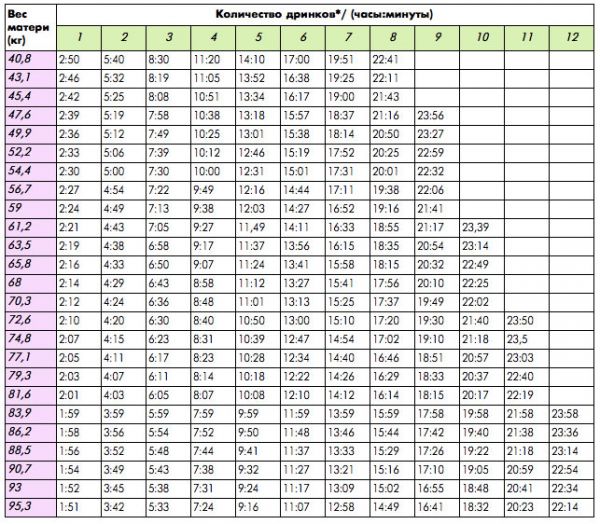
For example: if a mother weighs 59 kg and she drank a glass of wine, then according to the table it is safe to feed the baby after 2 hours and 24 minutes. If you drank 2 glasses, you will have to wait almost 5 hours. In the case when the baby does not yet receive complementary foods and is completely dependent on breast milk, it is necessary to take care of the supply of food for him and express in advance.
So, if mom wants to drink, you must remember the following rules:
- Until the baby is 3 months old, it is better not to drink at all;
- feed the child immediately before drinking alcohol; if you know that you will drink a lot, express in advance;
- give preference to soft drinks and in reasonable quantities;
- Whatever the type of alcohol, always pay attention to the quality of the drink.
Love for your child can be expressed in different ways. One way is to practice moderation when it comes to drinking alcohol, or avoid it completely while breastfeeding.
Olya
Living deliciously is a whole science!
Add Your Comment Cancel reply
| 50 | 60 | 70 | 80 | 90 | |
| beer 4% | 00:46 | 00:42 | 00:37 | 00:32 | 00:28 |
| low alcohol drink 7% | 1:45 | 1:34 | 1:28 | 1:20 | 1:15 |
| wine 12% | 2:22 | 2:17 | 2:10 | 2:01 | 1:55 |
| champagne 11% | 2:00 | 1:55 | 1:50 | 1:45 | 1:40 |
| Port 18% | 3:16 | 3:10 | 3:02 | 2:52 | 2:42 |
| Liqueur 30% | 5:22 | 5:14 | 5:09 | 5:00 | 4:50 |
| Vodka 40% | 7:02 | 6:57 | 6:52 | 6:42 | 6:30 |
Wine: can you drink while breastfeeding?

The basis of wine is ethanol. The strength ranges from 9 to 22%. Wine from 9 to 16% is considered natural, and from 16 to 22% – fortified. The color is red, pink and white.
The wine contains the antioxidant resveratrol (up to 5.8 mg/l in red wine). According to the results of some studies, this natural substance reduces the likelihood of diseases of the cardiovascular system, prevents the occurrence of tumors, and also increases life expectancy [16]. Wine contains rubidium with anti-inflammatory, sedative and anti-allergic effects.
All the beneficial qualities of red wine appear only with moderate consumption (no more than 1 glass per day). There is an opinion that wine improves lactation. We repeat: this is not true.
Red wine
Typical red wine label
Red wine is made from black grapes. The red tint of the drink is created thanks to substances contained in the skin of grapes.
The positive effects of red wine on health are only possible with limited consumption. The negative consequences of drinking red wine while breastfeeding are the same as for other types of alcohol.
Example. A mother with a height of 162 cm and a weight of 59 kg drank a glass of red wine with an alcohol content of 11% and a volume of 150 ml. The maximum concentration of ethanol in the blood in ppm will reach ~0.28‰ in 30-60 minutes. The time for complete elimination of alcohol from breast milk will be 2 hours 31 minutes.
White wine
White wine is made from grapes of any color. The lack of shades of the drink is due to the manufacturing technology: it is made from berries without skin. The effect of white wine on breastfeeding is not fundamentally different from the effect of other alcoholic beverages.
Example. A mother with a height of 162 cm and a weight of 70 kg drank a glass of white wine with an alcohol content of 11% and a volume of 100 ml. The maximum alcohol concentration will be ~0.14‰ after 30-60 minutes. Elimination time is 1 hour 34 minutes.
Home wine
This is homemade wine production
Homemade wine is a homemade drink. It is made not only from grapes, but also from raisins, rowan berries, currants, blueberries, sea buckthorn, oranges, plums, raspberries, blackberries, gooseberries, apples, strawberries, blueberries, melons, cherries, apricots, etc.
Do not think that homemade wine is less harmful for a nursing mother. The alcohol contained in homemade wine has the same destructive effects as the alcohol in store-bought alcohol.
Conclusion on wine: tips for a nursing mother
If you really want to drink a glass of wine while breastfeeding, we recommend sticking to dry red wine: it contains the powerful antioxidant resveratrol and beneficial trace elements, such as rubidium. Fortified, sweet, semi-sweet and semi-dry wines are more difficult for the body to process compared to dry ones.
The volume of wine consumed per day should not exceed 100-150 ml [10].
Adviсe
It is clear from the examples how long it takes for alcohol to be removed from breast milk; it all depends on the type of drink and how much was drunk. It is better to try to avoid alcohol-containing cocktails during breastfeeding. Then there will be no questions: how long does it take for alcohol to be removed from breast milk? If there is no strong need, then it is better to replace wine with juices and drink non-alcoholic beer.
And then calmly breastfeed the baby. Do not forget that the child’s liver is still very weak and cannot cope with the breakdown of alcohol; he may be severely intoxicated. Also, children are often allergic, and drinking a glass of wine can cause not only alcohol poisoning, but also severe allergies.
Myths and reality
According to statistics, every seventh mother who gives her child milk drinks alcohol. A woman who allows herself a glass of beer or a glass of cognac in the company of friends believes that she is not harming her baby.
We are not discussing cases of developed dependence on alcohol and what the consequences are for the child’s body from maternal alcoholism. Everything is already very clear.
We suggest you read: Conceiving a child while intoxicated, consequences
In general, there are several different views of healthy mothers on the question that worries many - can breastfeeding women drink:
- Alcohol is a taboo during planning, the period of gestation, after childbirth and the entire period of natural breastfeeding.
- Drinking alcohol (beer, cocktails, low-alcohol drinks) during breastfeeding is acceptable if you drink occasionally and in minimal dosages.
- A nursing mother can “enjoy” alcohol if she follows safe drinking techniques.
Which opinion is more reasoned, only you can decide after reading the article, but for now you should consider the numerous myths and speculations surrounding nursing mothers and alcoholic beverages.
- Myth No. 1. Beer improves lactation. Some “well-wishers”, having offered a nursing mother a glass of beer, convince that it affects the volume of milk. Probably, this opinion was formed due to the fact that after consuming this foamy drink, the child more often asks for the breast, that is, the number of meals increases. Scientists have proven that, despite the increase in the frequency of feedings after beer, the total volume of milk is reduced by 25%. This means you can’t drink beer to improve lactation.
- Myth No. 2. Alcohol helps a child fall asleep. Often, nursing mothers are advised to drink a glass of beer or a glass of weak wine before evening feeding so that the baby can sleep well all night. However, American scientists have refuted this misconception, finding that maternal consumption of alcoholic beverages leads to the opposite effect. At first, the child, having eaten the “drunk” milk, feels light, then little by little he begins to fall asleep. But these dreams are short, shallow, and there are no resting phases during which the baby could regain strength. And the duration of sleep in a child who has drunk “drunk” milk is significantly shorter than in a child who has consumed a healthy product without additives.
- Myth No. 3. Alcohol does not change the taste of milk. A nursing mother who takes this opinion for granted is certainly mistaken. Many foods and drinks, including those containing alcohol, change the taste and composition of breast milk. If a nursing mother enjoys a glass of beer or drinks 100 grams of strong drink before breastfeeding, the baby often refuses milk that has become unusual.
- Myth #4: Expressing reduces the alcohol content of your milk. There is little logic in such actions, since alcohol is not able to accumulate in mother’s milk. This substance, penetrating into the bloodstream, with its help enters the mammary glands, and then, having completed a “circle,” returns to the blood again. That is, it is useless to express the “intoxicating” product, since this will not reduce the alcohol in the milk. In this regard, it is useless to drink large amounts of liquids - tea or water.
- Myth No. 5. Severe intoxication of the mother does not pose a danger to the child. Naturally, with excessive libations, the alcohol in milk exceeds all reasonable limits, which is fraught with big problems for the baby. In addition, “several times a hundred” significantly slows down the reaction time of a nursing mother to various stimuli. The baby turns around, tries to get up in a crib or stroller, grabs onto potentially dangerous objects - all this requires speed and attention from the mother. The consequences of a mother’s insufficiently quick reaction can be disastrous.
- Myth No. 6. Alcohol in minimal doses can relieve stress in nursing mothers after childbirth. An absolutely unfounded statement, since ethyl alcohol can only increase depression, including that occurring after childbirth. In addition, the body of a newborn baby is not able to cope with the toxic effects of alcohol that reaches it through milk. The damage will be caused, first of all, to the immature children's liver.
Myths about alcohol during lactation:
- “Beer increases the amount of milk” - ethanol sometimes increases the number of feedings (the baby asks for the breast more often), and reduces the concentration of nutrient fluid by 25%. Therefore, you cannot drink the drink to improve lactation.
- “Alcohol improves a baby’s sleep” - indeed, after a “drunk” feeding, the child has a desire to go to bed. However, such rest is shallow and disturbing. The baby cannot fully regain his strength. Sleep duration becomes shorter.
- “Alcohol does not affect the taste of milk” is a big misconception. After drinking alcohol, the baby often refuses to breastfeed, as the taste becomes unusual for him.
- “After expressing, the milk is cleared”—ethanol cannot accumulate in the breast. With the blood flow, it penetrates the glands, and then returns to the vessels again. Therefore the statement is erroneous. Drinking a lot of liquid won't help clear your milk either.
- “Severe intoxication of the mother does not pose a threat to the child” - ethanol in large volumes can greatly harm the health of the baby. In addition, with a pathological condition, all reactions in a woman slow down. She cannot provide proper care for the baby.
- “Alcohol relieves postpartum depression” - on the contrary, alcohol only worsens it.
